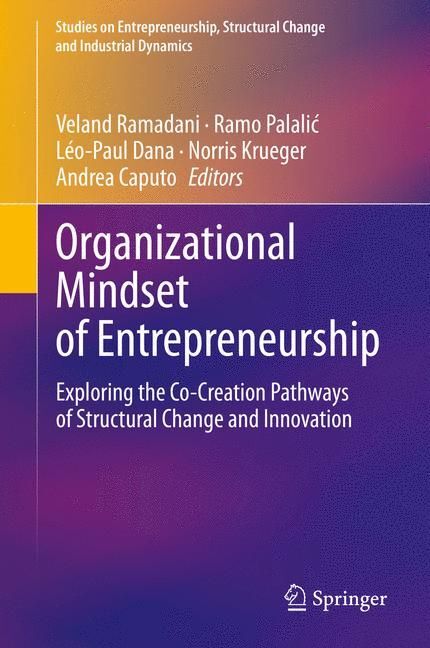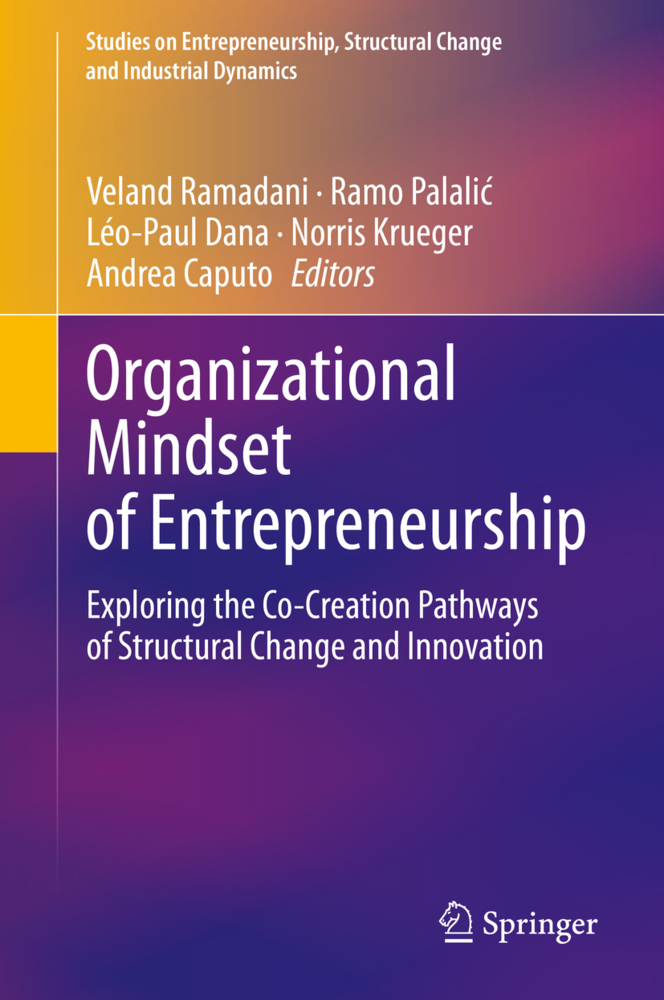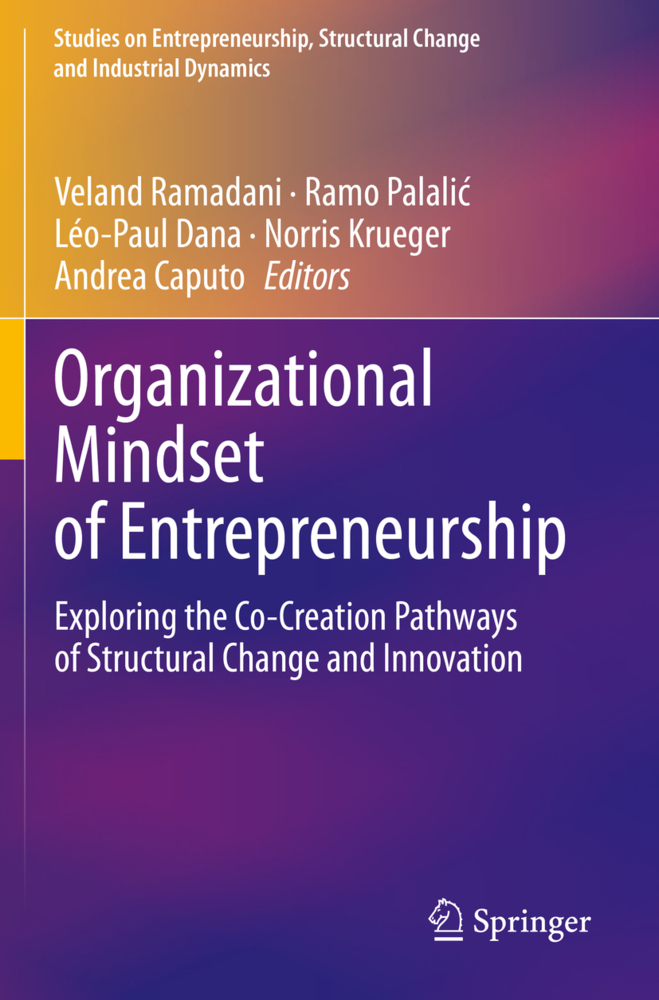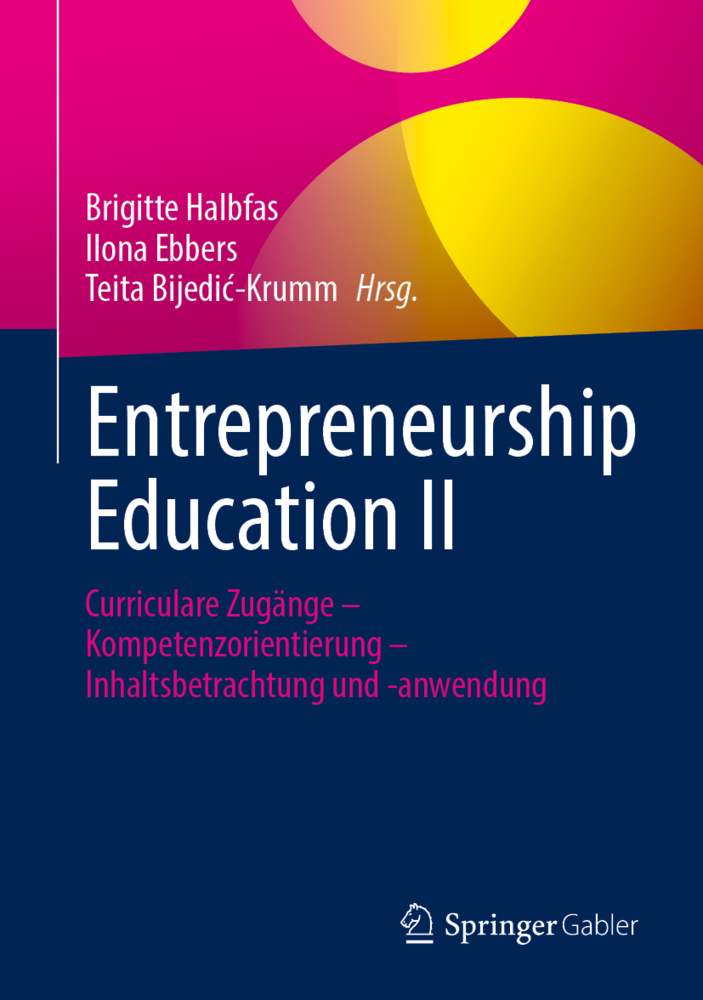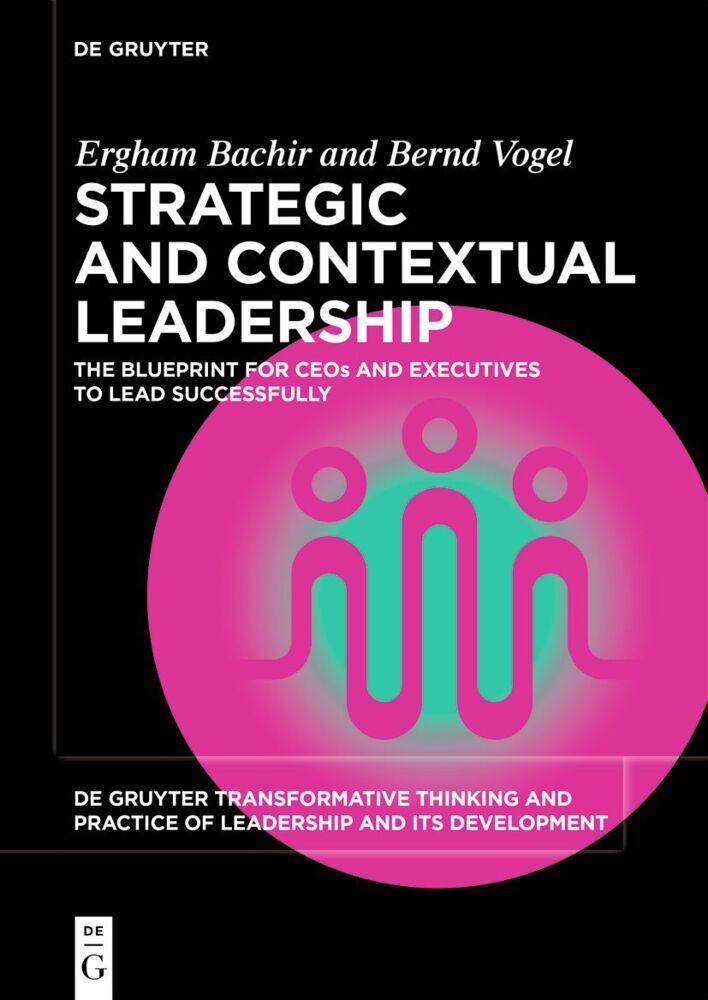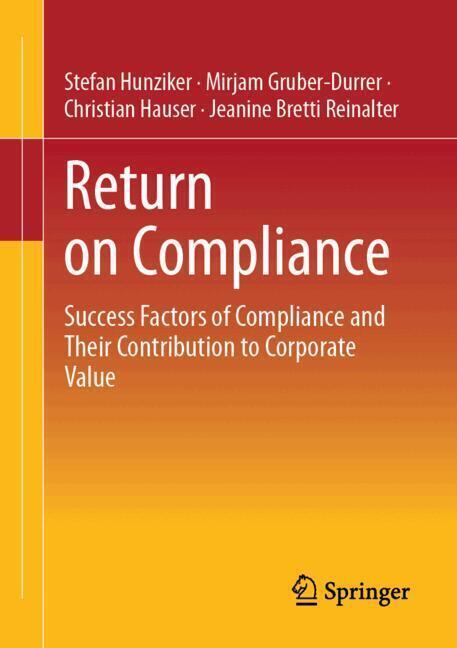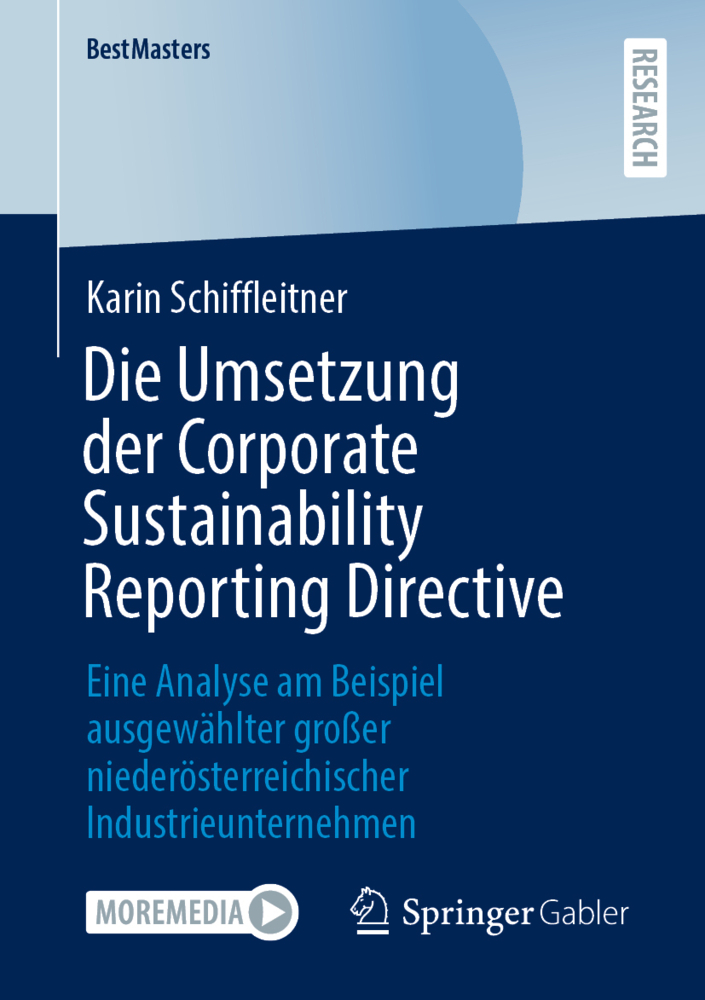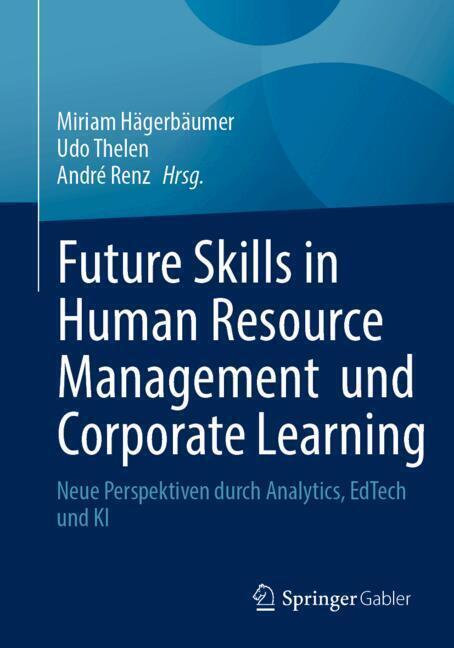Organizational Mindset of Entrepreneurship
Organizational Mindset of Entrepreneurship
This book focuses on how to promote innovation and an entrepreneurial mindset within organizations in the context of structural changes. It highlights the importance of internal marketing of innovation and ideas among employees, of creating collaborative spaces, and of company leaders promoting collaboration. The key aspect in all contributions gathered here is to understand the co-creation paths of structural change and innovation, and how they contribute to competitive advantage. The respective chapters address topics such as intrapreneurship, organizational mindset, creating an entrepreneurial orientation, strategic leadership, and internal & external organizational networking. All contributions are based on the latest empirical and theoretical research, and provide key findings and concrete recommendations for organizations.
Veland Ramadani is an Associate Professor at South-East European University, the Republic of Macedonia, where he teaches both undergraduate and postgraduate courses in entrepreneurship and small business management. His research interests include entrepreneurship, small business management, family businesses and venture capital investments. He authored or co-authored around 120 research articles, 10 textbooks and 14 edited books. Dr. Ramadani is an Associate Editor of International Journal of Entrepreneurship and Small Business (IJESB). In 2017, he was appointed as a member of the Supervisory Board of Development Bank of North Macedonia, where for eight months served as an acting Chief Operating Officer (COO). Dr. Ramadani received the Award for Excellence 2016 - Outstanding Paper by Emerald Group Publishing (Journal of Enterprising Communities: People and Places in the Global Economy). His last book, co-authored with Robert D. Hisrich, is Entrepreneurial Marketing, published by Edward Elgar.
Ramo Palali? is an Assistant Professor at the Economics and Management Department, Faculty of Business and Administration, and he is a Coordinator of Leadership and Entrepreneurship Centre (LEC) at the International University of Sarajevo (IUS), Sarajevo, Bosnia and Herzegovina. His research interests are entrepreneurship, leadership, marketing, SMEs and family businesses. He teaches at all three cycle study levels in the above areas. Apart from this, he is actively involved in business projects in the areas of entrepreneurial leadership and marketing management, in private and public organizations. He has authored and co-authored several articles, book chapters, and one book in internationally recognized publishers. Additionally, he is serving a few journals as reviewer/editor board member.
Léo-Paul Dana is a Professor at Montpellier Business School (France) and a founding member of the public research centre 'Montpellier Research in Management, MRM (EA 4557, Univ. Montpellier)'. He is also a member of the Entrepreneurship and Innovation Chair, which is part of LabEx Entrepreneurship (University of Montpellier, France) and funded by the French government (Labex Entreprendre, ANR-10-Labex-11-01). A graduate of McGill University and HEC-Montreal, he was formerly the Marie Curie Fellow at Princeton University (USA) and Visiting Professor at INSEAD.
Norris Krueger is among few scholars who are able to make a difference in research, education and entrepreneurship. Dr. Krueger has managed to keep moving the needle for all three, with proven, recognized expertise in growing entrepreneurial thinkers and entrepreneurial communities. As a thought leader in entrepreneurial learning, his programs earned six national and two global best practice awards. Most-cited scholar in his specialty on entrepreneurial thinking, he's had external fellowships with Max Planck Institute for Economics and Senior Subject Matter Expert at OECD/EU for entrepreneurial learning and entrepreneurial ecosystems. Active on Twitter, Facebook, LinkedIn & www.norriskrueger.com - feel free to connect!
Andrea Caputo is Reader in Strategy & Entrepreneurship at the University of Lincoln (UK), where he co-founded the UNESCO Chair in Responsible Foresight for Sustainable Development and the Lincoln Innovation in Family Enterprises (LIFE) Observatory. He received his PhD in Management from the University of Rome 'Tor Vergata' (Italy). He has also held visiting positions at several universities, like the University of Queensland, George Washington University, University of Malta, Alicante, Macerata and Naples Parthenope. His main research expertise is related to entrepreneurship, strategic management, negotiation, and decision-making. He has authored more than 40 international publications and presented at leading conferences. He is editor of the book series Entrepreneurial Behaviour by Emerald, and the author of the book Strategic Corporate Negotiations, published by Palgrave.
1;Foreword;9 2;Contents;11 3;Editors and Contributors;13 4;Organizational Mindset of Entrepreneurship: An Overview;16 4.1;1 Introduction;17 4.2;2 Book Structure;18 4.3;3 Conclusion;20 4.4;References;20 5;Entrepreneurial Leadership and Its Impact on the Emergence of Entrepreneurial Ventures;23 5.1;1 Introduction;23 5.1.1;1.1 Conceptual Framework;24 5.2;2 Entrepreneurship;24 5.3;3 Leadership;26 5.4;4 Entrepreneurial Leadership;27 5.4.1;4.1 Leadership Styles for Entrepreneurial Ventures;29 5.5;5 The Concept of Emergence in Entrepreneurship;31 5.5.1;5.1 Entrepreneur, Opportunity, and Venture Emergence;32 5.6;6 Impact of Entrepreneurial Leadership on the Emergence of Ventures;33 5.7;7 Conclusion;34 5.8;References;34 6;Too Much of a Good Thing? Employee Human Capital and the Accelerated Internationalization of Belgian Small- and Medium-Sized C...;39 6.1;1 Introduction;39 6.2;2 Theory and Hypotheses;41 6.2.1;2.1 Accelerated Internationalization;41 6.2.2;2.2 Aggregate Employee Human Capital and Accelerated Internationalization;43 6.2.3;2.3 The ``Too-Much-of-a-Good-Thing´´ Effect of Aggregate Human Capital;44 6.2.4;2.4 The Role of Technology Sector;46 6.3;3 Methods;47 6.3.1;3.1 Context of the Study;47 6.3.2;3.2 Sources of Data;47 6.3.3;3.3 Measures;48 6.3.4;3.4 Statistical Procedure;51 6.4;4 Results;51 6.5;5 Discussion;53 6.5.1;5.1 Main Findings;54 6.5.2;5.2 Boundaries, Limitations, and Directions for Future Research;59 6.6;6 Implications and Conclusions;59 6.7;Appendix;60 6.7.1;OECD Technology Sector Classification;60 6.8;References;61 7;Entrepreneurial Mindset and SMEs´ Sustainability;66 7.1;1 Introduction;66 7.1.1;1.1 Study Objective;67 7.1.2;1.2 Scope of Study;68 7.1.2.1;1.2.1 Overview of ``Grada?ac´´ City;68 7.2;2 The Theory;70 7.3;3 Methods;73 7.3.1;3.1 Questionnaire Design;74 7.3.2;3.2 Data Collection;76 7.4;4 Data and Results;76 7.4.1;4.1 A Brief Profile of SMEs;76 7.5;5 Discussion of Results;77 7.5.1;5.1 Study 1: Understanding the Phenomenon ``Entrepreneurial.´´ What Is It?;78 7.5.2;5.2 Study 2: How to Establish? A Pathway to Success;79 7.5.3;5.3 Study 3: How to Maintain? The Long-Term Success;81 7.6;6 Conclusion;82 7.6.1;6.1 Understanding the Phenomenon ``Entrepreneurial´´;83 7.6.2;6.2 A Pathway to Success;83 7.6.3;6.3 The Long-Term Success;84 7.6.4;6.4 Limitations, Future Work, and Implications;85 7.7;References;86 7.8;Websites;90 8;Exploring the Effects of Learning Organization on Innovative Work Behaviors of White-Collar Workers: Sample from Turkey;91 8.1;1 Introduction;92 8.2;2 Literature Background;93 8.2.1;2.1 Learning Organization;93 8.3;3 Innovative Behavior;97 8.4;4 Relations Learning Organizations (LO) and Innovative Work Behavior (IWB);100 8.5;5 Research Methodology;101 8.5.1;5.1 Sample and Data Collection;101 8.5.2;5.2 Measures;101 8.5.3;5.3 Analysis and Findings;102 8.5.3.1;5.3.1 Correlation Analysis;103 8.5.3.2;5.3.2 Regression Analysis;103 8.6;6 Discussion;105 8.7;References;107 9;Features of the Entrepreneurial Mindset of SMEs´ Owners in the Moldavian Unfriendly Environment;113 9.1;1 Introduction;114 9.2;2 Literature Review;114 9.3;3 Profile of the SMEs Sector and Assessment of the Business Environment in the Republic of Moldova;116 9.4;4 Business Strategies of Moldavian Entrepreneurs in an Unfriendly Environment;119 9.5;5 Some Conclusions;128 9.6;References;128 10;Skill Sets, Employee Types, and Strategies for Remediation: Analytical and Clinical Considerations for the Workplace;132 10.1;1 Introduction;132 10.2;2 Focusing on Specific Skills;134 10.3;3 Interpersonal Interaction Skills;136 10.4;4 Employee Prototypes;140 10.5;5 Introduction to Coaching and Counseling;144 10.6;6 Strategies;148 10.7;7 Discussion and Conclusions;158 10.8;References;160 11;Human Capital and Innovation: An Analysis of Western Balkans;163 11.1;1 Introduction;163 11.2;2 A Framework of the Entrepreneurial Mindset, Human Capital, and Innovation;165 11.3;3 Methodology;169 11.4;4 Peculiarities of the Western Balkans Region;170 11.5;5 Curre
Ramadani, Veland
Palalic, Ramo
Dana, Léo-Paul
Krueger, Norris
Caputo, Andrea
| ISBN | 9783030369514 |
|---|---|
| Artikelnummer | 9783030369514 |
| Medientyp | E-Book - PDF |
| Copyrightjahr | 2020 |
| Verlag | Springer-Verlag |
| Umfang | 243 Seiten |
| Sprache | Englisch |
| Kopierschutz | Digitales Wasserzeichen |

